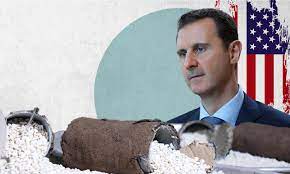The UK and US have imposed sanctions on those responsible for the illicit captagon trade, which is estimated to be worth up to $57 billion to the Assad regime.
From: Foreign, Commonwealth & Development Office and Lord Ahmad of Wimbledon
Captagon is a highly addictive amphetamine which is used throughout the Middle East, with 80% of the world’s supply produced in Syria.
The Syrian regime is closely involved in the trade – multi-billion dollar shipments leave regime strongholds such as the Port of Latakia, and President Bashar al-Assad’s brother Maher al-Assad commands the unit of the Syrian Army facilitating the distribution and production of the drug.
Trade in the drug is a financial lifeline for the Assad regime – it is worth approximately 3 times the combined trade of the Mexican cartels. The production and trafficking of captagon enriches Assad’s inner circle, militias and warlords, at the expense of the Syrian people who continue to face crippling poverty and repression at the hands of the regime.
The UK and US have today imposed coordinated sanctions on individuals involved in the trade, with the UK list including senior regime officials facilitating the trade to the manufacturers of the drug and key Hizbollah associates responsible for trafficking it across the Middle East. This includes prominent businessmen, militia leaders, and relatives of Bashar al-Assad. These sanctions constitute an asset freeze and UK travel ban on the individuals concerned.
Lord (Tariq) Ahmad of Wimbledon, Minister of State for the Middle East, said:
The Assad regime is using the profits from the captagon trade to continue their campaign of terror on the Syrian people.
The UK and US will continue to hold the regime to account for brutally repressing the Syrian people and fuelling instability across the Middle East.
The Assad regime, Hezbollah, and other Iranian-backed militia all facilitate the captagon industry, and in doing so fuel regional instability and creating a growing addiction crisis across the region.
The UK remains committed to supporting the Syrian people both in their quest for accountability and in providing humanitarian assistance. The UK has provided over £3.8 billion in humanitarian assistance to Syria and the region since the conflict began, our largest ever response to a single crisis.
The full list of those sanctioned is:
- Abdellatif Hamid: a prominent businessperson who utilises his factories to package captagon pills and has been linked to the 2020 captagon seizure in Salerno, Italy
- Imad Abu Zureiq: a militia leader in Southern Syria. His militia is associated with drugs smuggling as well as assassinations and kidnappings of political opponents
- Mustafa Al Masalmeh: a militia leader in Southern Syria. His militia is involved in drugs production and he has been involved in assassinating opponents of the Syrian regime
- Taher Al Kayali: a business magnate with links to the captagon industry. He has been tied to multiple captagon seizures, including in Europe
- Amer Khiti: a Syrian politician and operates and controls multiple businesses in Syria which facilitate the production and smuggling of drugs, including captagon
- Hassan Muhammad Daqqou: known as the ‘king’ or ‘emperor’ of captagon and is associated with Hizbollah. He has been linked to captagon seizures in the Middle East, Europe and South East Asia
- Mohammed Shalish: involved in the shipping sector in regime strongholds and has been tied to captagon shipments which have left the port of Latakia
- Raji Falhout: a militia leader in Sweida and uses his militia headquarters to facilitate captagon production
- Samer Kamal Al Assad: related to the Syrian President, and is a prominent actor in the production of captagon
- Waseem Badia Al Assad: related to the Syrian President and is a ‘strongman’ for the Syrian regime. He facilitates the manufacturing and smuggling of captagon
- Noah Zaiter: a prominent person involved in smuggling captagon and narcotics. He is associated with the Syrian regime and Hezbollah
- UK.GOV


Leave a Reply
You must be logged in to post a comment.